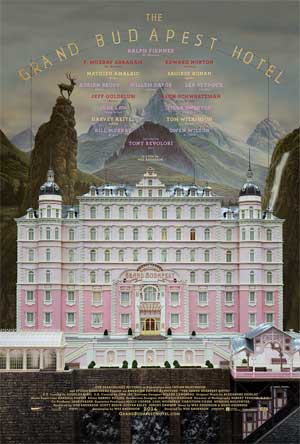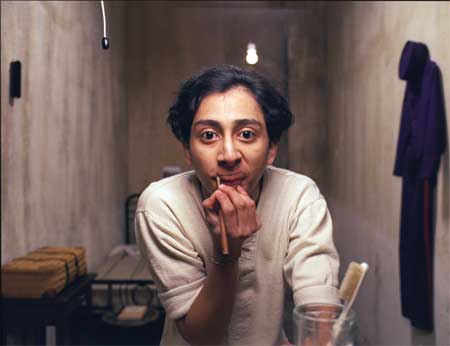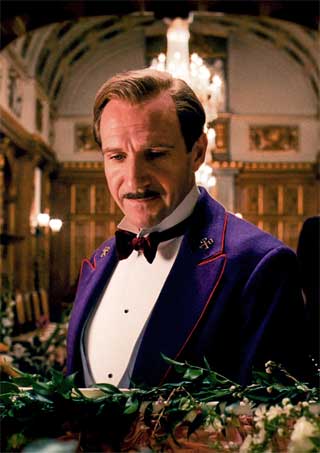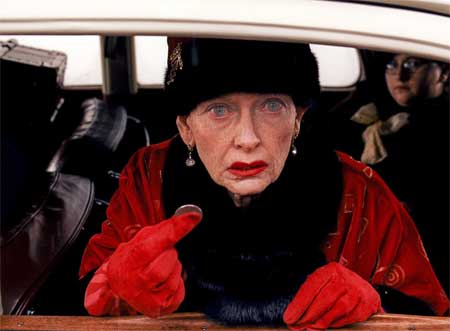Film (2014)
Written and directed by Wes Anderson
Based on a story by Wes Anderson and Hugo Guinness
Inspired by the works of Stefan Zweig
Music by Alexandre Desplat; Cinematography by Robert D. Yeoman; Film Editing by Barney Pilling; Casting By Douglas Aibel, Jina Jay; Production Design by Adam Stockhausen; Art Direction by Stephan O. Gessler, Gerald Sullivan, Steve Summersgill; Set Decoration by Anna Pinnock; Costume Design by Milena Canonero
With Ralph Fiennes (M. Gustave), Tony Revolori (Zero), F. Murray Abraham (Mr. Moustafa), Mathieu Amalric (Serge X.), Adrien Brody (Dmitri), Willem Dafoe (Jopling), Jeff Goldblum (Deputy Kovacs), Harvey Keitel (Ludwig), Jude Law (Young Writer), Bill Murray (M. Ivan), Edward Norton (Henckels), Saoirse Ronan (Agatha), Jason Schwartzman (M. Jean), Tilda Swinton (Madame D.), Tom Wilkinson (Author) and Owen Wilson (M. Chuck)

It does not really matter which Wes Anderson film you wind up in – you will be brought into a fantasy world that is full of colorful oddities. His staple cast of actors inhabit all sorts of roles, and the characterizations are always offbeat and ironic. The photography and editing will also be striking and tastefully done.
There is no exception here.
The story is one of a former lobby boy, Zero, played with open-eyed wonder by Tony Revolori, who, in old age (F. Murray Abraham) tells his tale of early youth coming to the grand hotel. He is brought under the wing of Mr. Gustave H, played with gusto and constant amusement by Ralph Fiennes, who shows him the ropes as a hotelier of impeccable attention and taste, but also one of surprises.
It turns out that Gustave H has a kind of capacity for engendering relationships with wealthy old female patrons of the hotel and, as a result of passages and inheritances, comes into the middle of a suspenseful combat with Dmitri (Adrien Brody), the son of one of these patrons, Madame D., played with extensive and almost unbelievable makeup by Tilda Swinton.
So, this becomes not only a comedy of manners, which it certainly could have been on its own terms, but a wild goose chase as well.

in “The Grand Budapest Hotel”
Photo: Courtesy of Fox Searchlight Pictures
Tony Revolori, who plays the young Zero (with a drawn on moustache) is an understated wonder. He is innocent and worldly-wise at the same time and one can certainly see him growing up into F. Murray Abraham’s seasoned and sage Mr. Moustafa.

Saoirse Ronan as Agatha
in “The Grand Budapest Hotel”
Photo: Courtesy of Fox Searchlight Pictures
Saoirse Ronan who plays Zero’s love interest, Agatha, offers a character with charming, offbeat street savvy that hovers within a translucent shell of innocence.
Jason Schwartzman, the luminous Max of Anderson’s early masterpiece Rushmore (1998), is present as M. Jean, offering his delightfully ironic sangfroid, as is Owen Wilson, another Anderson regular, in the role of M. Chuck, slightly bemused. Schwartzman, Wilson and Adrien Brody (who here convincingly plays the villain, Dmitri) had played the traveling band of brothers, to great humorous success, in Anderson’s The Darjeeling Limited (2007).

in “The Grand Budapest Hotel”
Photo: Courtesy of Fox Searchlight Pictures
Ralph Fiennes is superbly ridiculous and irresistibly charming as the formal, demanding and totally unpredictable Gustave H. He is full of great, funny turns and manages to cram a wild ride into a faux-formal dandy, exhibiting something close to the core of Anderson’s characterological speciality, the offbeat renegade in official clothing who takes his job very seriously. Gustave H, in some ways, is another variant of Max (of Rushmore fame), given a managerial role and situated a few decades earlier.
As well, there are numerous other bright lights: Willem Dafoe weighs in as the bodyguard-heavy Jopling, Bill Murray wanders in as M. Ivan, Edward Norton is the annoyingly dedicated police inspector Henckels, and Jeff Goldblum is dutifully dutiful as Deputy Kovacs. Tom Wilkinson, Jude Law and Harvey Keitel also show up. Obviously, getting into a new Wes Anderson film is getting to be the thing to do. We seem to have a new American auteur on our hands.

in “The Grand Budapest Hotel”
Photo: Courtesy of Fox Searchlight Pictures
In addition to his capacity for writing punchy and offbeat dialogue, Anderson’s photographic eye and editorial sense are really exquisite. Each frame is beautiful, even if frequently odd. It is a visually satisfying experience to see Anderson’s films, and they get better in this way as they go along. His last film, Moonrise Kingdom (2012), was also visually striking.
The riveting score by Alexandre Desplat is mostly a kind of non-stop balalaika polka music, wonderfully played and fabulously energetic.
The cinematography by Robert D. Yeoman and film editing by Barney Pilling are first-rate.
This film is wittily conceived, beautifully crafted, and superbly fun.
– BADMan
Leave a Reply